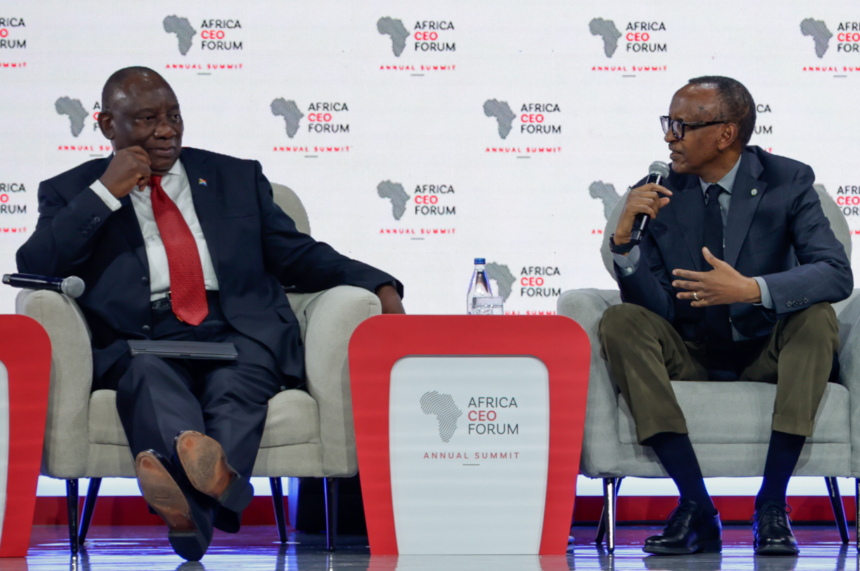South African President Cyril Ramaphosa has spoken out against claims made by white South Africans who have fled the country, stating that they are not being persecuted but are opposed to the transformation process in the country. Speaking at the Africa CEO Forum in Abidjan, Ramaphosa addressed the issue of Afrikaners who have accepted US President Donald Trump’s offer to accept them as refugees due to alleged racial persecution in South Africa.
Ramaphosa emphasized that the claims of persecution are not true and that those who have fled are a “fringe group” that opposes the transformation process. He highlighted that South Africa is committed to building a united nation in line with the Constitution and the teachings of iconic leaders like Nelson Mandela and Oliver Tambo. Ramaphosa expressed his intention to continue with the implementation of transformation policies and rejected any suggestion of reverting to apartheid-type policies.
The President revealed that he had discussed the matter with President Trump, who expressed understanding of the situation. Ramaphosa clarified that those who have fled are not being mistreated but are resistant to embracing the changes taking place in South Africa. He reiterated the commitment to progressing with transformation and building a united nation.
Ramaphosa’s comments were supported by South Africa’s international relations minister, Ronald Lamola, who addressed the issue at a media briefing. The discussions at the Africa CEO Forum also touched on Trump’s tariff war and the reduction of development aid to Africa. Other panelists, including Rwandan President Paul Kagame, emphasized the need for Africa to become self-reliant and economically integrated through initiatives like the African Continental Free Trade Area (AfCFTA).
The African leaders at the forum highlighted the importance of finding solutions to the continent’s challenges and achieving peace and stability in conflict regions. Ramaphosa and Kagame, who had disagreements earlier this year on the conflict in the Democratic Republic of the Congo, emphasized the need for African solutions to African problems. They emphasized the importance of owning and appropriating solutions on the continent to drive growth and development.
In conclusion, Ramaphosa reiterated the commitment to peacebuilding efforts on the continent and emphasized the need for unity and collaboration among African nations. The discussions at the Africa CEO Forum underscored the importance of Africa taking ownership of its challenges and working towards sustainable solutions for the benefit of its people. The future of the African continent lies in the hands of its people, and it is our responsibility to build peace and prosperity for ourselves. President Ramaphosa emphasized the importance of the Africa Continental Free Trade Area (AfCTA) as a transformative mechanism that can drive growth and unity across the continent. He urged the private sector to embrace this opportunity, highlighting the vast market potential and GDP of $3.4 trillion that can be unlocked through the agreement.
Ramaphosa emphasized the need for infrastructure development to support trade and investment, calling for collaboration between the public and private sectors. He stressed the importance of putting investors’ money to good use and urged for meaningful projects that can drive economic growth and development.
During the Covid-19 pandemic, Africa demonstrated its ability to come together and find solutions to challenges such as securing personal protective equipment and developing vaccines. President Kagame echoed the sentiment of self-reliance and resilience, emphasizing the need for Africa to define its own path and not rely solely on external assistance.
The Africa CEO Forum brought together leaders from various sectors to discuss ways to strengthen economic governance, optimize public policy, and accelerate the implementation of the AfCTA. The theme of the forum, “Can a New Deal Between State and Private Sector Deliver the Continent a Winning Hand?”, highlighted the importance of collaboration between government and businesses to drive progress and prosperity on the continent.
In conclusion, the future of Africa depends on our ability to work together, harness our potential, and create a sustainable and prosperous future for generations to come. It is time for Africa to take the lead in shaping its own destiny and building a continent that is self-reliant, resilient, and united.







